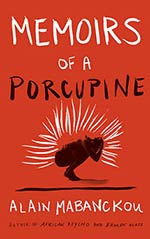
![]() charlesdee
charlesdee
3/6/2016
![]()
Porcupine -- this is apparently both his name and his species -- is the animal double to the boy Kibandi. But porcupine is not one of those benevolent animal spirits you usually read about, one assigned to a human child at birth to act as his guardian and spiritual guide. When Kibandi is eleven years old, his father takes him into the jungle and forces him to drink mayamvumbi, a home brew so powerful, so evil that it is kept buried in secret locations. Porcupine, who until this time has been living the relatively pleasant life of an African porcupine, is summoned to this ceremony and bound to the drunken child for life. He will be Kibandi's harmful double, "the liveliest, scariest kind of double." He observes the child's young life, and follows Kibandi and his mother to another village for a fresh start after an incident involving Kibandi's father and a suspicious pattern of unexplained deaths. It is not until after the death of Kibandi's mother that he and Porcupine begin their true work, which is murder.
Mabanckou's novel takes place in the present day Congo where village sorcerers compete with priests and doctors, and traditional ways confront modernizing trends. One young man Kibandi finds particularly offensive spends half his time in France. When this designer-clothed young scholar returns to visit his family, he exhibits all manner of obnoxious affectations. You know this will not bode well for his long-term survival. A theme that seems to run through Manbankou's novel is the crippling and often deadly influence of traditions that in the story are protected by the carefully aimed quills of Kibandi's harmful double.
Porcupine anguishes over many of the missions he must complete for his master, but accepts them as his duty. I cannot imagine the hardhearted reader who will not sympathize with him as he pours his soul out to an impassive baobab tree. It is Porcupine's nonchalant and engaging voice that makes this account of malevolence and black magic a pleasure to read.